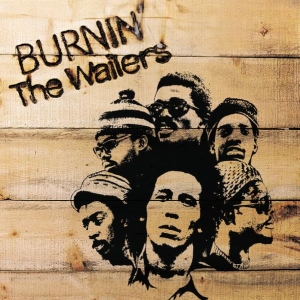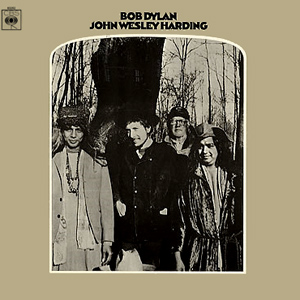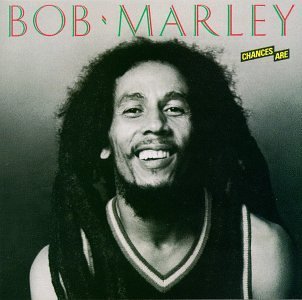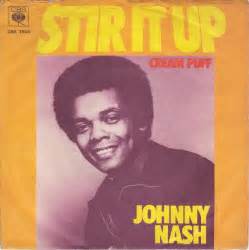
Burnin' is the sixth album by Jamaican reggae group the Wailers, released in October 1973. It was written by all three members and recorded and produced by the Wailers in Jamaica, contemporaneously with tracks from the Catch a Fire album with further recording, mixing and completion while on the Catch a Fire tour in London. It contains the song "I Shot the Sheriff". It was the last album before Marley, Peter Tosh and Bunny Wailer decided to pursue solo careers, while continuing their local releases through their company Tuff Gong Records. A commercial and critical success in the United States, Burnin' was certified Gold and later added to the National Recording Registry, with the Library of Congress deeming it historically and culturally significant.

Catch a Fire is the fifth studio album by the reggae band The Wailers, released in April 1973. It was their first album released by Island Records. After finishing a UK tour with Johnny Nash, they had started laying down tracks for JAD Records when a disputed CBS contract with Danny Sims created tensions. The band did not have enough money to return to Jamaica, so their road manager Brent Clarke approached producer Chris Blackwell, who agreed to advance The Wailers money for an album. They instead used this money to pay their fares back home, where they completed the recordings that constitute Catch a Fire. The album has nine songs, two of which were written and composed by Peter Tosh; the remaining seven were by Bob Marley. While Bunny Wailer is not credited as a writer, the group's writing style was a collective process. For the immediate follow-up album, Burnin', also released in 1973, he contributed four songs. After Marley returned with the tapes to London, Blackwell reworked the tracks at Island Studios, with contributions by Muscle Shoals session musician Wayne Perkins, who played guitar on three overdubbed tracks. The album had a limited original release under the name The Wailers in a sleeve depicting a Zippo lighter, designed by graphic artists Rod Dyer and Bob Weiner; subsequent releases had an alternative cover designed by John Bonis, featuring an Esther Anderson portrait of Marley smoking a "spliff", and crediting the band as Bob Marley and the Wailers.

The La's were an English rock band from Liverpool, originally active from 1983 until 1992. Fronted by singer, songwriter and guitarist Lee Mavers, the group are best known for their hit single "There She Goes". The band was formed by Mike Badger in 1983 and Mavers joined the next year, although for most of the group's history, the frequently changing line-up revolved around the core duo of Lee Mavers and John Power along with numerous other guitarists and drummers including Paul Hemmings, John "Timmo" Timson, Peter "Cammy" Cammell, Iain Templeton, John "Boo" Byrne, Chris Sharrock, Barry Sutton and Neil Mavers.

An album is a collection of audio recordings issued on compact disc (CD), vinyl, audio tape, or another medium such as digital distribution. Albums of recorded sound were developed in the early 20th century as individual 78 rpm records collected in a bound book resembling a photo album; this format evolved after 1948 into single vinyl long-playing (LP) records played at 33+1⁄3 rpm.

John Wesley Harding is the eighth studio album by American singer-songwriter Bob Dylan, released on December 17, 1967, by Columbia Records. Produced by Bob Johnston, the album marked Dylan's return to semi-acoustic instrumentation and folk-influenced songwriting after three albums of lyrically abstract, blues-indebted rock music. John Wesley Harding was recorded around the same time as the home recording sessions with The Band known as The Basement Tapes.

Bob Marley and the Wailers were a Jamaican ska, rocksteady and reggae band. The founding members, in 1963, were Bob Marley, Peter Tosh, and Bunny Wailer.

"Redemption Song" is a song by Jamaican singer Bob Marley. It is the final track on Bob Marley and the Wailers' twelfth album, Uprising, produced by Chris Blackwell and released by Island Records. The song is considered one of Marley's greatest works. Some key lyrics derived from a speech given by the Pan-Africanist orator Marcus Garvey titled "The Work That Has Been Done."

Live! is a 1975 album by Bob Marley and the Wailers which was recorded live in concert during July 1975 at the Lyceum Theatre, London. "No Woman, No Cry " was released as a single.
Overdubbing is a technique used in audio recording in which audio tracks that have been pre-recorded are then played back and monitored, while simultaneously recording new, doubled, or augmented tracks onto one or more available tracks of a digital audio workstation (DAW) or tape recorder. The overdub process can be repeated multiple times. This technique is often used with singers, as well as with instruments, or ensembles/orchestras. Overdubbing is typically done for the purpose of adding richness and complexity to the original recording. For example, if there are only one or two artists involved in the recording process, overdubbing can give the effect of sounding like many performers.

Chances Are is a compilation album by Bob Marley released in 1981 by WEA International throughout the world, and through the Cotillion imprint of Atlantic Records in the U.S.

The Wailing Wailers is the 1965 eponymous debut studio album by the Wailers, later known as Bob Marley and the Wailers. Released on the Studio One label, the album is a compilation of various recordings made between 1964 and 1965 by Neville “Bunny” Livingston, Robert Nesta Marley and Peter McIntosh. It compiles what Clement Coxsone Dodd considered the best Wailers recordings from this period. They were accompanied by the Studio One backing band, The Soul Brothers.

"Stir It Up" is a song composed by Bob Marley in 1967 and first recorded by the group Bob Marley and the Wailers that year and issued as a single. It was later covered by American singer Johnny Nash on his 1972 album I Can See Clearly Now. The following year, Marley and the Wailers re-recorded the song for their album Catch a Fire.
"One Love" is a ska song by Bob Marley's original group The Wailers from their 1965 debut studio album The Wailing Wailers. It was rerecorded as part of the 1970 medley "All in One", which contained reggae reworkings of their early ska songs. This was released as a single and is also included on the compilation African Herbsman under the name "All in One".

Robert Nesta Marley was a Jamaican singer, musician, and songwriter. Considered one of the pioneers of reggae, his musical career was marked by fusing elements of reggae, ska, and rocksteady, as well as his distinctive vocal and songwriting style. Marley's contributions to music increased the visibility of Jamaican music worldwide, and made him a global figure in popular culture. Over the course of his career, Marley became known as a Rastafari icon, and he infused his music with a sense of spirituality. He is also considered a global symbol of Jamaican music and culture and identity, and was controversial in his outspoken support for democratic social reforms. In 1976, Marley survived an assassination attempt in his home, which was thought to be politically motivated. He also supported legalisation of marijuana, and advocated for Pan-Africanism.
The Picks was an American vocal quartet that backed Buddy Holly and the Crickets' band on nine of the first twelve Crickets releases on Brunswick in 1957, as well as backing Buddy Holly solos for group sounds. The original members were John Pickering (lead), Bill Pickering (tenor), and Bob Lapham (baritone).

Never Before is a compilation album by the American rock band the Byrds, consisting of previously unreleased outtakes, alternate versions, and rarities. It was initially released by Re-Flyte Records in December 1987 and was subsequently reissued on CD in 1989, with an additional seven bonus tracks.
Bob Dylan bootleg recordings are unreleased performances by American singer-songwriter Bob Dylan, that have been circulated throughout the public without undergoing an official, sanctioned release. It is commonly misconceived that bootlegs are only restricted to audio, but bootleg video performances, such as Dylan's 1966 film Eat the Document, which remains officially unreleased, are considered to be bootlegs. Dylan is generally considered to be the most bootlegged artist in rock history, rivaled only by the Grateful Dead.

"I'm Losing You" is a song written by John Lennon and released on his 1980 album Double Fantasy. It was written in Bermuda in June 1980, after several attempts by Lennon to call his wife, Yoko Ono, who remained in New York. The song is also available on the 1982 compilation The John Lennon Collection, the 1998 boxset John Lennon Anthology, the one disc compilation Wonsaponatime, the 2005 two disc compilation Working Class Hero: The Definitive Lennon and in 2010 for the Gimme Some Truth album. The song was also featured in the 2005 musical Lennon.

"Guava Jelly" is a song recorded by the Jamaican group Bob Marley and the Wailers. It was released as a 7" vinyl single through Tuff Gong and Green Door Records. It was issued commercially with B-side track "Redder Then Red", which was misspelled on its initial printing, in 1971. It was written and produced by Marley and features uncredited lyrical contributions from Bunny Livingston. A reggae composition like the majority of Marley's works, "Guava Jelly" contains a rocksteady and island-like production with lyrics loosely based around sexual intercourse. His use of the term "guava jelly" was likely referring to a specific type of sexual lubricant. It was favorably viewed by several reviewers, with many of them finding the composition to be sexual and about love. The group placed "Guava Jelly" on several compilation albums, including Africa Unite: The Singles Collection in 2005, and Owen Gray and Herbie Mann created their own versions in 1974 and 1975, respectively.













